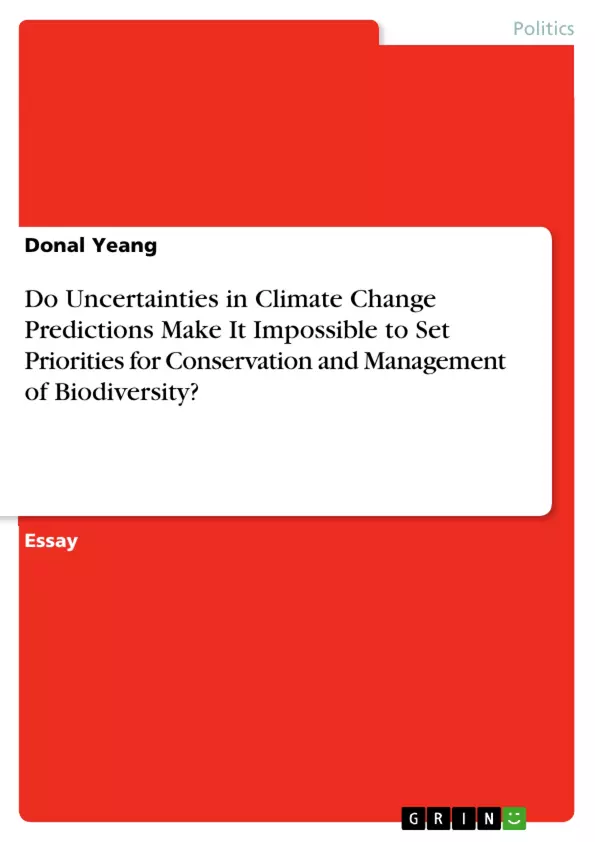The consequences of climate change to social, economical and environment are becoming the most concern issues of political, business and society leaders in both developed and developing countries. However, prediction of climate change impact becomes the concern among the scientists around the world. Uncertainties in climate prediction are the main obstacles for climate change mitigation and adaptation.The high level of uncertainties in climate changes prediction causes high risk in management action. The uncertainties can mean that the impact of climate change can be lower or higher than expected by scientists.The uncertainties derive from the range of socio-economic development scenarios, climate model projections, the downscaling of climate effects to local/regional scales, impacts assessments, and feedbacks from adaptation and mitigation activities. In addition, high level in uncertainties can increase the cost of climate change adaptation and mitigation strategies. Moreover, setting up the priorities for conservation and management of biodiversity is the challenge for all the countries in the world because climate change may happen rapidly than the current prediction. This is not meant that it is impossible to set up the priorities for conservation and management under the uncertain impact of climate change. This essay will look into the conservation and management measures of biodiversity under the climate variability due to uncertainties in prediction. Then it will highlight some practical examples from both developed and under developed countries.
Inhaltsverzeichnis (Table of Contents)
- Introduction
- Conservation of biodiversity under uncertainty
- Management of biodiversity under uncertainty
- Conclusion
Zielsetzung und Themenschwerpunkte (Objectives and Key Themes)
This essay aims to explore the conservation and management of biodiversity in the face of uncertainties in climate change predictions. It will discuss the challenges posed by these uncertainties, highlighting practical examples from both developed and developing countries.- The impact of climate change on biodiversity
- The challenges of setting conservation and management priorities under uncertainty
- The role of adaptive management in mitigating climate change impacts
- The importance of local knowledge and traditional practices in climate change adaptation
- The need for collaboration between scientists, policymakers, and communities
Zusammenfassung der Kapitel (Chapter Summaries)
Introduction
This chapter introduces the topic of climate change and its impact on biodiversity. It highlights the uncertainties in climate predictions and the challenges they pose for conservation and management efforts.Conservation of biodiversity under uncertainty
This chapter explores the impacts of climate change on biodiversity, including changes in species distribution, reproduction timing, and ecosystem dynamics. It emphasizes the importance of incorporating biodiversity conservation plans into regional planning and the challenges posed by uncertainties in climate change impact predictions.Management of biodiversity under uncertainty
This chapter discusses the role of adaptive management in mitigating climate change impacts. It emphasizes the need for robust strategies and the importance of learning by doing. The chapter also highlights the role of local knowledge and traditional practices in adapting to climate change at the grassroots level.Conclusion
This chapter summarizes the key points of the essay, emphasizing the challenges and opportunities presented by climate change for biodiversity conservation and management. It highlights the importance of collaboration, adaptive management, and local knowledge in mitigating climate change impacts.Schlüsselwörter (Keywords)
The essay focuses on the challenges and opportunities associated with conserving and managing biodiversity under the uncertainties of climate change predictions. Key terms include climate change impacts, biodiversity conservation, adaptive management, local knowledge, and traditional practices.Frequently Asked Questions
How do climate change uncertainties affect biodiversity conservation?
Uncertainties in climate predictions, such as the speed of change and local impacts, make it difficult to set long-term priorities and can increase the costs of mitigation and adaptation strategies.
What is "adaptive management" in the context of biodiversity?
Adaptive management is a strategy of "learning by doing," where management actions are continuously monitored and adjusted based on new data to mitigate the impacts of unpredictable climate changes.
Why is local knowledge important for climate adaptation?
Local and traditional practices often provide practical, grassroots-level solutions for adapting to environmental variability that scientific models might overlook.
Where do the uncertainties in climate change predictions come from?
They derive from various socio-economic development scenarios, different climate model projections, the challenges of downscaling effects to a local level, and feedback loops from human activities.
Is it still possible to set conservation priorities despite these uncertainties?
Yes, the essay argues that while challenging, it is not impossible. It requires robust strategies, collaboration between scientists and policymakers, and the integration of biodiversity plans into regional planning.
- Quote paper
- Donal Yeang (Author), 2009, Do Uncertainties in Climate Change Predictions Make It Impossible to Set Priorities for Conservation and Management of Biodiversity?, Munich, GRIN Verlag, https://www.grin.com/document/140603



